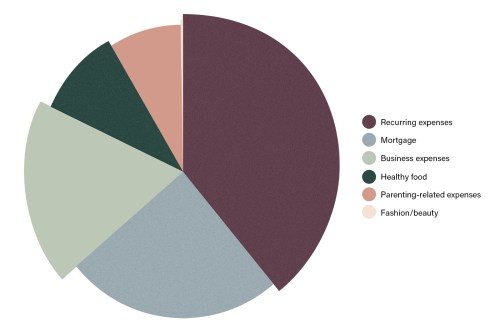Our editors independently select these products. Making a purchase through our links may earn Well+Good a commission
How Divorce Affected a 48-Year-Old Psychologist’s Finances—For the Better
A 48-year-old therapist with a teenage daughter shows the impact between divorce and finances, showing how it affected her.

You know where your friends get their hair done, what their dream job is, and even the details of the most recent fight they had with their partner. But what about their salary? Or how much they spend on athleisure every month? For some reason, talking about money remains taboo for many.
That’s where Well+Good’s Checks+Balanced series comes in. Think of it as a space to inspire more open and frank conversations around money—especially regarding how different people are able to afford the wellness habits that are important to them.
Here, Jamie, a 48-year-old clinical psychologist and mother, shares the ins and outs of her personal finances and how working for herself comes into play. Plus, she delves into divorce and finances, revealing how her situation affected her spending habits.
Keep reading to see how Jamie budgets for herself, her daughter, and her business while affording her favorite healthy habits.

Jamie, 48, clinical psychologist, Hartford, Connecticut
Income: $120,000 per year. Before I got divorced seven years ago, I worked as a clinical psychologist in a hospital making $70,000 per year. My husband also made $70,000 a year, working for himself as a psychologist. I quit my job and got divorced around the same time, having decided to launch my own private practice. For years leading up to that decision to work for myself, I had watched my husband run his business, and the intel I picked up helped me learn what I needed to do in order to be successful. Now, I make even more money than I did when we were married—and I get to work for myself.
Mortgage: $1,900 per month. I live with my 13-year-old daughter in a four-bedroom house, which I own.
Business expenses: $875 per month. I pay $725 a month to rent an office for my private practice. Even though I’m working with clients virtually right now due to COVID-19, I still have to pay rent. Other than rent, though, my business expenses are pretty minimal. I pay about $30 a month for advertising services, $70 a month for an electronic medical record system, and $50 a month for Zoom.
Other recurring expenses:$1,855 per month. I have a student loan payment of $600 per month, which is one of my biggest recurring bills. Otherwise, I pay $315 for my car payment, $110 for insurance, $200 for utilities, and another $200 for my phone bill, which includes WiFi. I also pay $580 a month for my health insurance because I work for myself. It’s not the greatest insurance plan, so anytime I go to the doctor, the out-of-pocket costs can be quite high. I also have pet insurance for our dog, which is $50 a month.
Parenting-related expenses: $400 per month. My daughter lives with me full-time and my husband doesn’t pay child support, which is something I am looking into remedying. Between cello and karate lessons—which are both virtual right now—I spend about $400 a month on extracurricular activities for my daughter.
Healthy food: $450 per month. I shop pretty exclusively at Whole Foods because buying organic food is important to me. I don’t follow a specific type of eating plan, per se, but I do try to limit processed foods, instead prioritizing buying fresh foods. Throughout the pandemic, I’ve been fortunate enough to be able to get what I want and need from the grocery store, but I make less frequent trips.
I also have a subscription to Blue Apron, which is $60 a month and makes three meals a week that my daughter and I share. We also eat out—or, these days, order in—about once or twice a week. I would estimate that I spend $400 on groceries a month (including the Blue Apron subscription) and $50 on takeout.
Fitness: $0 per month. My biggest source of exercise is walking the dog. She forces me to take walks several times a day. I do have basic exercise equipment at home that I use—free weights, an exercise ball, and a mat—to do at-home workouts and stretching.
Fashion and beauty: $80 per year. I’m not really into athleisure or beauty products. The only makeup I wear every day is L’Oreal mascara, so my spending in this area are pretty minimal.
Other wellness habits: $0 per month. Before I got divorced, I used to see a therapist, but that was one of the expenses I cut when I was getting ready to launch my own business and was being quite careful with my finances. The most important wellness habit to me is providing healthy food for my daughter and myself.
If you want to be featured in Checks+Balanced, email [email protected].
Want help navigating life events during uncertain times? Head to Fidelity for intel on handling curveballs like divorce—from assessing your individual financial situation to negotiating terms and rebuilding your life.
Sponsored by Fidelity
Sign Up for Our Daily Newsletter
Get all the latest in wellness, trends, food, fitness, beauty, and more delivered right to your inbox.
Got it, you've been added to our email list.









